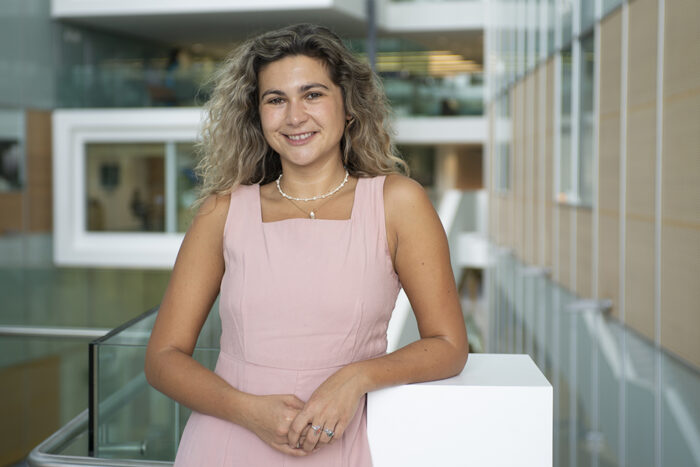
The LMB is delighted to announce the appointment of Diana Arseni as the newest Group Leader in our Neurobiology Division, where she will investigate the role of lysosomal protein TMEM106B in brain health, ageing and disease.
Diana commented, “I am honoured and excited to continue my scientific career as a Group Leader in the Neurobiology Division at the LMB. My research group will study mechanisms of ageing and neurodegeneration focusing on the lysosomal protein TMEM106B. I cannot think of a better place that offers the environment and intellectual stimulation to support investigating such fundamental questions.”
Diana’s research group will focus on the lysosomal protein named transmembrane protein 106B (TMEM106B). During her postdoctoral work in the Ryskeldi-Falcon group, Diana determined the structure of TMEM106B amyloids from different neurodegenerative diseases in collaboration with the Goedert and Scheres groups, and she identified the presence of TMEM106B amyloids in healthy aged brains, associating TMEM106B amyloid formation with ageing. TMEM106B genetic variants have also been found to modulate healthy ageing and disease risk in frontotemporal lobal degeneration (FTLD) and Alzheimer’s disease. However, the underlying mechanisms behind TMEM106B and its implications for ageing and disease are, as yet, unknown.
TMEM106B has been implicated in various lysosomal processes. Lysosomes are highly dynamic organelles, present at the crossroads of cell signalling, transcription, and metabolism. Their role was initially understood to be key to degrading cellular waste, though understanding of lysosomes have since expanded and it is now established that they are also intrinsic to ageing and neurodegeneration. Diana will use multidisciplinary approaches to shed new insights into the role of lysosomal TMEM106B in ageing and neurodegeneration. Ultimately, this advanced understanding will help identify new avenues of research in lysosomal biology in the context of ageing and may lead to the development of new therapeutic strategies to slow the processes of ageing and neurodegeneration.
Diana received an M.Sci. in Biomedicine from the University of Lancaster, followed by a Ph.D. in Neuroscience and Immunology from the University of Glasgow and AstraZeneca. In 2020, she joined the LMB, working with Benjamin Ryskeldi-Falcon to study structures of pathological protein assemblies in neurodegenerative disease using electron cryo-microscopy. Her research on this topic has been recognised with the Joan A. Steitz Postdoc Prize in 2023. Diana is also a Junior Research Fellow at Darwin College, University of Cambridge, where she participates in the governing of the College, and is involved in the academic and social community.